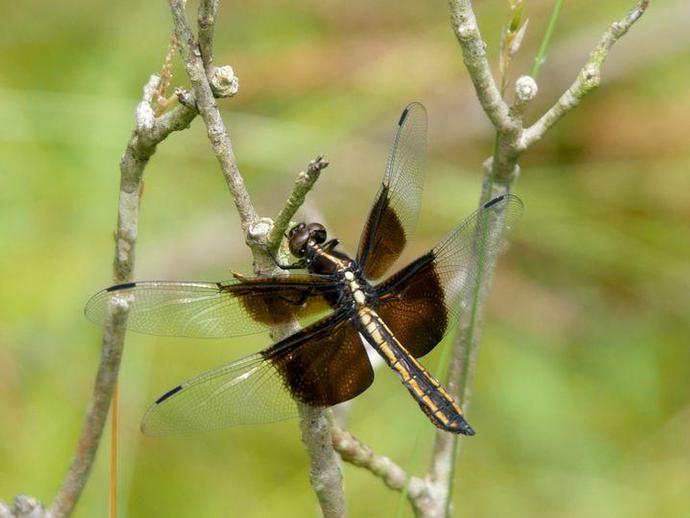May 22, 2021
We're reaching into the archives for today's #BenInNature update presented by our friends at Carter Bank & Trust! The following post was originally published on June 25, 2020.
This striking dragonfly is a female Libellula luctuosa, better known as the "widow skimmer." It's a pretty common dragonfly and can be found across the United States (except in some of the higher parts of the Rocky Mountains).
Dragonflies look similar to a related group of insects, the damselflies (Zygoptera). It's easy to tell the difference, however; most dragonflies hold their wings flat and away from their bodies, as seen here, while damselflies fold their wings while they're at rest. Damselflies are also weak fliers, while dragonflies are incredibly agile.
If you're an insect, the dragonfly is a predator to be feared. They spend their larval stage as predatory aquatic nymphs. When they emerge from the water and molt their old exoskeleton, they become flying adults that can grab other insects out of mid-air. They can consume as much a fifth of their body weight in insects per day!
Dragonflies also have excellent vision, which makes them tricky to sneak up on when you're trying to get a good photo. If I manage to snap a shot of another species of dragonfly, I'll be sure to share it here!
ABOUT #BenInNature
Social distancing can be difficult, but it presents a great opportunity to become reacquainted with nature. In this series of posts, Administrator of Science Ben Williams ventures outdoors to record a snapshot of the unique sights that can be found in the natural world. New updates are posted Monday - Friday, with previous posts highlighted on the weekends. This series of posts is made possible thanks to the support of VMNH Corporate Partner Carter Bank & Trust (www.cbtcares.com).
NATURE PHOTO IDENTIFICATIONS
If you discover something in nature that you would like help identifying, be sure to message us right here on Facebook with a picture (please include location and date of picture) and we'll have our experts help you identify it!

 Hours & Admissions
Hours & Admissions Directions
Directions

